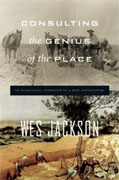Consulting the Genius of the Place
Wes Jackson
book reviews:
· general fiction
· chick lit/romance
· sci-fi/fantasy
· graphic novels
· nonfiction
· audio books
· author interviews
· children's books @
curledupkids.com
· DVD reviews @
curledupdvd.com
newsletter
win books
buy online
links
home
for authors
& publishers
for reviewers

 |
Consulting the Genius of the Place: An Ecological Approach to a New Agriculture Wes Jackson Counterpoint Hardcover 224 pages October 2010 |
|
Wes Jackson has long been an advocate of environmentally sustainable practice in all things, particularly in agriculture. His latest book draws its title from a centuries-old doctrine promoted by Alexander Pope in 1731, which encouraged landscape artists to consult the “genius of the place” - that is, to allow the local ecosystem to show the way when designing and planting.
Jackson suggests that we focus on strengthening our foundation: the source of life, the single greatest area of human impact. Consulting the Genius of the Place As early as the 1940s, other conservationists recognized the importance of such thinking. Jackson quotes the president of the Canadian Conservation Society, Dr. John Detwiler: “…an overcrowding of people on a diminished soil base may impinge on the intellect, lead to physical and nervous disorders, and break forth ultimately in the hidden hunger that brings on wars.”While it may seem a stretch to connect erosion to wars, a little thought will reveal just how aptly Detwiler named the source of almost every global issue we are still facing today. As small family farms vanish to be replaced by industrial agriculture, communities lose connection and cohesiveness. When human beings are cut off from that sense of place and identity, there is less and less motivation to bond and create with others a supportive and sustaining way of life. Jackson emphasizes the point by giving us an update on the well-known painting entitled Norman Rockwell Visits a County Agent. The wholesome and picturesque scene that Rockwell captured has faded, and the family depicted has dissolved into a typical 21st-century story of children leaving the farm to pursue more profitable means of making a living. It is more than the loss of a sentimental notion, Jackson insists; as land is abandoned and abused, the people who depend upon a healthy ecosystem are losing both physical and mental health, societal families, and quality of life. Jackson and other like-minded conservationists are calling for an end to the mono-cultural agriculture that developed largely after World War II and a return to the traditional polyculture that ensures sustainability and health not only of the land but of the culture and the individuals who are a part of it. Jackson follows up studies of specific examples of local initiatives where soil fertility has been regained and communities revitalized through such practices, then offers four simple ways in which the same success can be accomplished in any region. Consulting the Genius of the Place Originally published on Curled Up With A Good Book at www.curledup.com. © Deborah Adams, 2011 |
|
|
|
 Click here to learn more about this month's sponsor! |
|
| fiction · sf/f · comic books · nonfiction · audio newsletter · free book contest · buy books online review index · links · · authors & publishers reviewers |
|
| site by ELBO Computing Resources, Inc. | |
 With so many catastrophes looming over us, it is nearly impossible to grasp the scale and significance of the damage being done to the air, water, and soil. Add to that the staggering number of things we’re asked to do to combat the multiple crises – recycle, use less water, turn off the lights, eat organic, on and on—and the conflicting claims that climate change is or is not a myth, and it’s no wonder that many of us simply give up.
With so many catastrophes looming over us, it is nearly impossible to grasp the scale and significance of the damage being done to the air, water, and soil. Add to that the staggering number of things we’re asked to do to combat the multiple crises – recycle, use less water, turn off the lights, eat organic, on and on—and the conflicting claims that climate change is or is not a myth, and it’s no wonder that many of us simply give up.